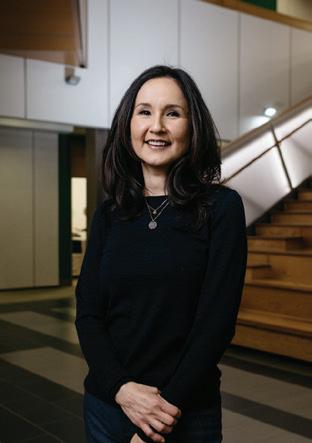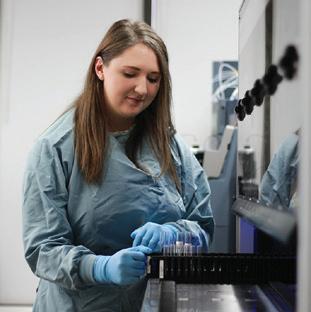
5 minute read
Education
MD students Alexander Wong (left) and Emily Fong (right) are helping post-secondary students Taelina Andreychuk (centre) and Ryan Scheltus (not pictured) prepare for the Medical College Admission Test.
Free student-led MCAT course supports aspiring MDs
Advertisement
UALBERTA MEDICAL STUDENTS LAUNCHED A NEW INITIATIVE TO INCREASE DIVERSITY IN HEALTH PROFESSIONS BY REDUCING OBSTACLES IN THE MEDICAL-SCHOOL APPLICATION PROCESS
AUTHOR
SHELBY SOKE
PHOTO BY
LAUGHING DOG PHOTOGRAPHY
THE MD ADMISSIONS Initiative for Diversity & Equity (MD AIDE) will make it easier for post-secondary students from low-income and Indigenous backgrounds to prepare for the infamously difficult Medical College Admission Test (MCAT).
“Registering for the MCAT exam itself costs a few hundred dollars, and that doesn’t include the cost of books, purchasing online practice questions or enrolling in tutoring, which can cost thousands of dollars,” said Alexander Wong, an MD student and co-lead of the initiative.
“One of the most concerning issues with regard to medical education is when only those who can afford it can access it. Our system has always favoured those coming from higher socioeconomic backgrounds,” said Emily Fong, another MD student and co-lead of MD AIDE.
Wong and Fong created the initiative to help make medical education more socially accountable and produce future physicians who will best serve the needs of the population.
“We talk about providing culturally safe care, especially with Indigenous communities, and one of the best ways we can do this is to have care providers that come from Indigenous backgrounds,” said Wong.
MD AIDE was offered for the first time from May to July 2018, with more than 30 per cent of the inaugural class of Indigenous descent. Early feedback from Indigenous participants suggests that the small class size, one-on-one engagement and feedback between students and MD AIDE leads—together with class time that works with their schedules—have made this experience meaningful for them. Many participants said they planned to take the MCAT in late summer 2018.
The MD AIDE program is medical student-run in partnership with the U of A’s Undergraduate Medical Education Office, the Office of Equity, Diversity and Inclusion and the Indigenous Health Initiatives Office within the Division of Community Engagement, and in collaboration with Communities United, an initiative under EndPoverty Edmonton.
Hearing Indigenous communities, walking together
INDIGENOUS COMMUNITIES AND UALBERTA HEALTH PROFESSIONALS BEGIN DIALOGUE TOWARDS A SHARED VISION OF INDIGENOUS HEALTH
AUTHOR
LAURA VEGA
PHOTO BY
MELISSA FABRIZIO

Top (from left) Tibetha Kemble, Elder Marilyn Buffalo, Jill Konkin and Barry Lavalle
Bottom left: Elder Rick Lightning
Bottom right: Tibetha Kemble
IN FEBRUARY 2018, First Nation Elders, community members and UAlberta health professionals came together to initiate a dialogue towards a shared vision for the future of Indigenous health.


“An important aspect of the gathering was having a high proportion of community partners guide and shape our shared future direction,” said Tibetha Kemble, director of Indigenous Health in the Faculty of Medicine & Dentistry’s Division of Community Engagement.“It’s working with Indigenous communities to determine where we’re going to go together,” added Jill Konkin, associate dean, Division of Community Engagement.
A federal report released in 2018 indicates that despite new funding to support improved health outcomes, Indigenous peoples now have a 15-yearshorter life expectancy than nonIndigenous peoples—nearly two times the gap reported 20 years ago. For Elder Rick Lightning, from Maskwacîs, it was important for non-Indigenous people to learn about the misconceptions of how communities are funded to address their health problems.
“We’re given $50,000 to work with suicide. It costs $10,000 to bury one child. We’re already looking at 14 people who committed suicide since December 2017 and we’re supposed to try to fight the suicide epidemic in our communities,” said Lightning.
He praised Indigenous university students as survivors beating the odds of suicide, alcoholism and more. “Like when turtles are born and race to the ocean with predators around, those students are like the few turtles that made it through.”

Undergraduate updates


Radiation Therapy
PROGRAM MILESTONE
ELEVEN STUDENTS GRADUATED in June 2018 with a 100-per-cent pass rate for the Canadian Association of Medical Radiation Technologists national competency-based certification examination.
UPDATES
For the first time, senioryear students are actively participating on the clinical floor at Tom Baker Cancer Centre in Calgary. Thank you to the clinical staff at Tom Baker for being so welcoming and supportive of our students.
The Radiation Therapy Student Association continues to grow in its capacity, offering valuable Lunch ‘n Learn sessions where students can work on developing their professional identities.
The program recently recruited internationally acclaimed radiation therapy faculty member, Amanda Bolderston.
Medical Laboratory Sciences
PROGRAM MILESTONE
THE PROGRAM WAS first established in 1958, making 2018 its diamond anniversary.
UPDATES
A stakeholder-driven curriculum redesign, to be implemented in 2020, has focused on the essential employability skills and professionalism required for the next generation of technologists. The senior year of the degree will contribute to the precision health movement by integrating research, management and emerging technologies.
Student leaders have initiated a series of Student Wellness Nights, with learners from all years of the MLS program invited to take part in a range of activities such as paint night, financial wellness talks, a session on nutrition and a puppy playdate organized in collaboration with Sundance Animal Rescue.
Dental Hygiene
PROGRAM MILESTONE
THE DENTAL HYGIENE degreeonly program’s first cohort of students have completed their first year.
UPDATES
Dental hygiene students are delving deeper into the determinants of health from a broad range of personal, social, economic and environmental factors that determine individual and population health.
An online module enhances students’ understanding of Indigenous peoples and includes a variety of active learning strategies, from small-group discussions and narrated presentations, readings, podcasts and videos, to reflective learning whereby the students describe their feelings about the content presented. Topics include treaties, colonization, residential schools, Indian hospitals, oral health and health disparities.










